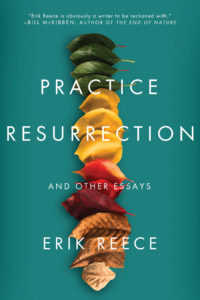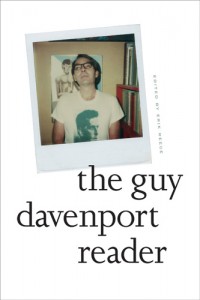Erik Reece
Erik Reece is Davenport's literary executor. He lives in Lexington, KY.
Subscribe to our newsletter for news & events from Counterpoint Press.
Books
Practice Resurrection
And Other Essays
"Erik Reece is obviously a writer to be reckoned with."—Bill McKibben, author of The End of NatureIn Erik Reece's stunning collection of essays, ideas are the main characters. Written over a period of ten years, and revealing Reece's continued obsession with religion, family, and the natural world, in many ways these essays represent a sequel to his stirring memoir, An American Gospel. In that book, Reece intimitately describes his conflicted relationship with Christianity in the context of the death of his father, and Reece's own journey since then to find meaning and balance in the material and spiritual worlds. Practice Resurrection continues that exploration through essays that take the reader to Norway, New England, London, the Adirondacks, Appalachia, and back to Reece's native Kentucky River.
"With his singular wit and pith, environmental writer Reece explores issues such as God, Christianity, the environment (of course), and his father's suicide in essays rife with sentient turns of phrase and exceptionally insightful passages . . . Few are better than [Reece] is at discussing a personal crisis of faith." —Booklist (starred review)
The Guy Davenport Reader
"The difference between the Parthenon and the World Trade Center, between a French wine glass and a German beer mug, between Bach and John Philip Sousa, between Sophocles and Shakespeare, between a bicycle and a horse, though explicable by historical moment, necessity, and destiny, is before all else a difference of imagination.The imagination is like the drunk man who has lost his watch, and must get drunk again to find it. It is as intimate as speech and custom, and to trace its ways we need to re–educate our eyes."—Guy Davenport
Modernism spawned the greatest explosion of art, architecture, literature, painting, music, and dance of any era since the Renaissance. In its long unfolding, from Yeats, Pound and Eliot to Picasso and Matisse, from Diaghilev and Balanchine to Cunningham and Stravinsky and Cage, the work of Modernism has provided the cultural vocabulary of our time.
One of the last pure Modernists, Guy Davenport was perhaps the finest stylist and most protean craftsman of his generation. Publishing more than two dozen books of fiction, essays, poetry and translations over a career of more than forty years, he was awarded a MacArthur Fellowship in 1990. In poetry and prose, Davenport drew upon the most archaic and the most modern of influences to create what he called "assemblages"—lush experiments that often defy classification. Woven throughout is a radical and coherent philosophy of desire, design and human happiness. But never before has Davenport's fiction, nonfiction, poetry and translations been collected together in one compendium. Eight years after his death, The Guy Davenport Reader offers the first true introduction to the far–ranging work of this neglected genius.

Catapult | Counterpoint | Soft Skull
20 Jay Street #704
Brooklyn, NY 11201
646.926.0805 | contact@catapult.co






